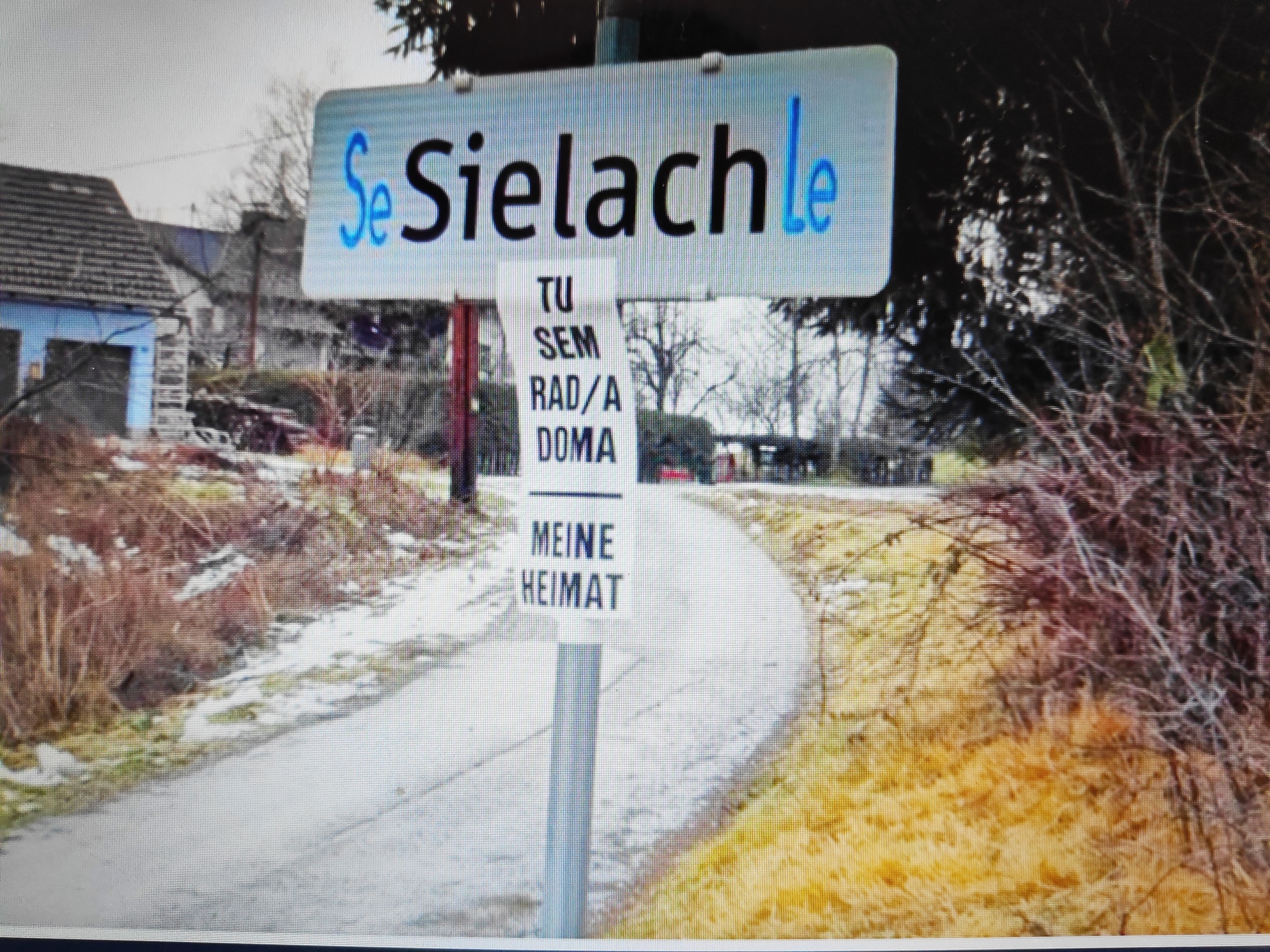
Franc K. is a retired resident of the town of Sielach/Sele in the municipality of Sittersdorf/Žitara vas and member of the minority of carinthian Slovenes. He has been prosecuted by the General Attorney of Carinthia for damage to property, because he put a sticker with the Slovenian name of his hometown “Sele” on the topographical sign of “Sielach”, which was only German. He did this act of civil disobedience to show, that the sign should be bilingual.
Although no real damage to the sign was done, because it was damaged before during a storm and because the sticker was removed without any problems, the prosecution went to trial, where Franc K. was acquitted, because no damage could have been found. The prosecution appealed to this sentence. The court of appeal now has to decide.
BACKGROUND
The case made headlines, because Mr. Franc K. is a ritired, but well known citizen of the municipality of Sittersdorf/Žitara vas. The municipality is a bilingual municipality, where during the last census 2001 15,5% of the population assigned themselves as Slovene. The Austrian Constitutional Court ruled in a series of decisions in the early 2000s, that because of article 7 of the State Treaty of Vienna topographical sings have to be bilingual, if more than 10% of the population consider themselves as Slovene in the census. The mayor of Sittersdorf/Žitara vas, who is in charge for putting up topographical sings (except on federal roads) ignored the ruling. To solve the issue of bilingual topographical signs politically in 2007 a first law was drafted under chancellor Schüssel. This draft included Sielach/Sele to have a bilingual sign.
In 2011 a new law was passed, the Law of the national minorities, which said, that bilingual topographical sings have to be put up in areas, where more than 17,5% of the population consider themselves Slovenes. So Sielach/Sele fell out. This law was a constitutional law, which means, that it is on the same jurisdictional level as article 7 of the State Treaty of Vienna, which was interpreted by the Constitutional Court of Austria to that effect, that a Slovenian population of 10% is enough.
The Law of the national minorities says, that municipalities can put up even more signs in areas, where there are less than 17,5% Slovenes. The neighboring municipality of Bleiburg/Pliberk did that, Sittersdorf/Žitara vas didn’t. To show the contradiction of the Law of the national minorities and the State Treaty of Vienna and the bigotry of the mayor of Sittersdorf/Žitara vas, Mr. K decided to make a peaceful protest and put a sticker with the slovene name of his hometown on the town’s sign. For this he was triad for damaging property in criminal court and the proceeding is still going on, he could face up to 6 months in prison or monetary punishment.
LEGAL FRAMEWORK
State Treaty of Vienna
It is a constitutional law and states in article 7 (3): “In the administrative and judicial districts of Carinthia, Burgenland and Styria, where there are Slovene, Croat, or mixed populations, the Slovene or Croat language shall be accepted as an official language in addition to German. In such districts topographical terminology and inscriptions shall be in the Slovene or Croat Language as well as in German.”
Framework Convention for the Protection of National Minorities by the Council of Europe, ratified by Austria
It states in article 11: “In areas traditionally inhabited by substantial numbers of persons belonging to a national minority, the Parties shall endeavour, in the framework of their legal system, including, where appropriate, agreements with other States, and taking into account their specific conditions, to display traditional local names, street names and other topographical indications intended for the public also in the minority language when there is a sufficient demand for such indications.”
Convention for the Protection of Human Rights and Fundamental Freedoms
Mr. K. only criticized the topic of bilingual topographical sings in a peaceful way. He stated a opinion and is therefore also protected by the article 10 of the Convention for the Protection of Human Rights and Fundamental Freedoms (Freedom of expression), which is in Austria also a constitutional law.
OPINIONS OF THE RESPECTIVE MONITORING BODIES OF THE COUNCIL OF EUROPE
In its 3rd Opinion on Austria, regarding the implementation of Article 11(3), the FCNM Advisory Committee regretted that the negotiated compromise of 17.5% of Slovenian-speaking population is far above the ruling of the Constitutional Court judgements, according to which a Slovenian population of 10% is enough.
In its 4th Opinion, the Advisory Committee regretted that many municipalities in Carinthia refused to provide bilingual topographical signs on municipal roads, despite the legal possibility to do so. It further regrets that the definition of “signs and inscriptions of a topographical nature” refers exclusively to place names but not to street names or other topographical indications, despite the fact that
these are explicitly mentioned in Article 11(3) of the Framework Convention and the Austrian State Treaty.
MNORITY MONITOR RECCOMENDATIONS
The Council of Carinthian Slovenes had already shown solidarity with Franz K. before his first trial and supported his demand that the local council of Sittersdorf/Žitara vas should place bilingual topograhical place signs in the village of Sielach/Sele.
The Slovenian legal system provides for strict bilingualism in the form of topographical inscriptions in the settlement area for the Hungarian and Italian ethnic communities.